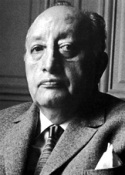Skip to: site menu | section menu | main content
Welcome To Democracy And Socialism .Com
Things should be made as simple as possible, but not any simpler- Albert Einstein
Miguel Angel Asturias (1899-1974) |
 |
Miguel Angel Asturias was a writer, poet, statesman, an ardent applicant of indigenous Guatemalan rights, a passionate anti-imperialist and a fighter for social justice in Guatemala and around the world.
He was born in Guatemala City on October 19th. His father Ernesto, a lawyer and judge and his mother Maria, a schoolteacher, opposed and clashed with the dictatorship of Manuel Estrada (1898-1920). As a result, they lost their jobs and in 1905 were forced to move to the town of Salama. There, Miguel lived on the farm of his maternal grandparents. His nanny, Lola Reyes, a young indigenous woman told him about the plague of indigenous people and narrated to him stories of their myths and legends. These remarks had great impact in shaping his future carrier and writings.
In 1908, Asturias family returned to the suburbs of Guatemala City, where they set up a supply store. As well, Miguel attended college and began writing while attending law school. He wrote his thesis in 1923, with the title “The Social Problem of Indian”, and wrote the first draft of a novel which is considered as his masterpiece, “The President”. This globally acclaimed novel examines how criminality and corruption spreads downward from the top to the bottom of a dictatorship stricken society. Justice is ridiculed and escape from the dictator’s tyranny is impossible. To survive under dictatorship, each character has to assume multiple personalities. Opportunism, sycophancy and flattery take deep roots in that society and fake as culture.
“The President” was completed in 1933, when the writer was in Paris. But the novel remained unpublished until 1946. It is believed that the book is a fervent denunciation of the United Fruit Company’s puppet regime of dictator Manuel Estrada.
After graduating from law school, he founded the Popular University of Guatemala with fellow students, whose aim was to offer courses to those who could not afford to attend the national university. He was also active in founding the Association of Student Universities and Students Rights.
In 1923, he traveled to England and then to France. There, he worked as a newspaper correspondent for several important Latin American newspapers. In Paris, he met and befriended such figures, like Pablo Picasso, Pablo Neruda and other socialists and communists.
In 1933, he returned to Guatemala ruled by another dictator, Jorge Ubico. Under Ubico’s dictatorship, American corporation United Fruit became the ultimate power and the main owner of Guatemala.
Ubico was forced to resign by a general strike against him which started in June 1944. With the presidency of Juan Jose Arevalo, Asturias was appointed as cultural attach» to the Guatemalan Embassy in Mexico, where the 1st edition of “The President” was published.
The fruit industry and how the Guatemalan natives were brutally exploited by the American imperialism became the subject of Asturias’ epic Banana Trilogy: “The Cyclone”, 1950, “The Green Pope”, 1954, and “The Eyes of the Interred”, 1960. These novels earned him the Soviet Union’s highest prize, the Lenin Peace Prize in 1966. One year later he won the Nobel Prize in Literature.
During the presidency of democratically elected Jacobo Arbenz (1951-1954), Asturias returned back to Guatemala and devoted much of his political energy towards supporting Arbenz.
When Arbenz’s government was toppled by the US imperialist interference and coup d’etat, Asturias was stripped from his Guatemalan citizenship and expelled. He went to Chile and then to his wife’s homeland Argentina, where he spent another eight years in exile. In 1962, when Argentina’s president Frondizi was removed from office by the army, Asturias was obliged to leave Argentina and moved to Europe again. In 1966, Julio Montenegro, the president of Guatemala, invited Asturas to the country and appointed him the Guatemalan Ambassador to France. He served there until 1970. Asturias spent his final years in Madrid, where he died in June 9, 1974.
A National Prize in Literature is dedicated to the memory of Asturias in Guatemala since 1988.
Some of his other works:
-
Guatemalan Sociology, 1923
-
The Building of a New Life, 1928
-
Legends of Guatemala, 1930
-
Poets, 1949
-
Men of Maize, 1949
-
Bolivar, 1955
-
Week-End En Guatemala, 1956
-
The Bejeweled Boy, 1961
-
The Mulata, 1963
-
Juan Girador, 1964
-
The Mirror of Lida Sal, 1967
-
Antologia, 1968
-
The Talking Machine, 1971